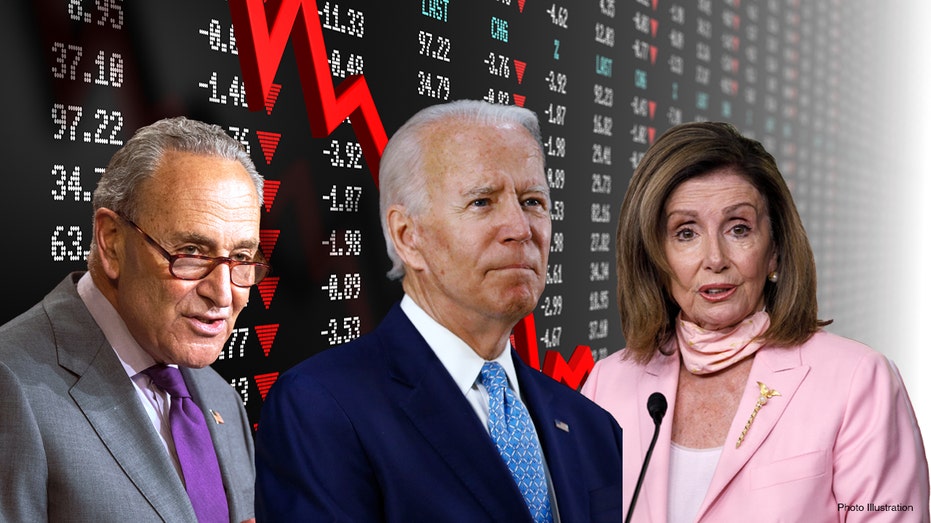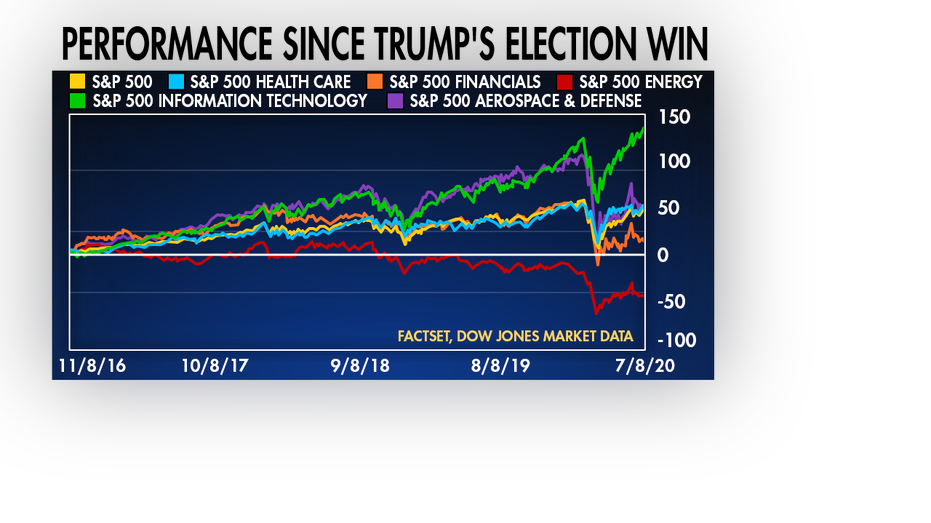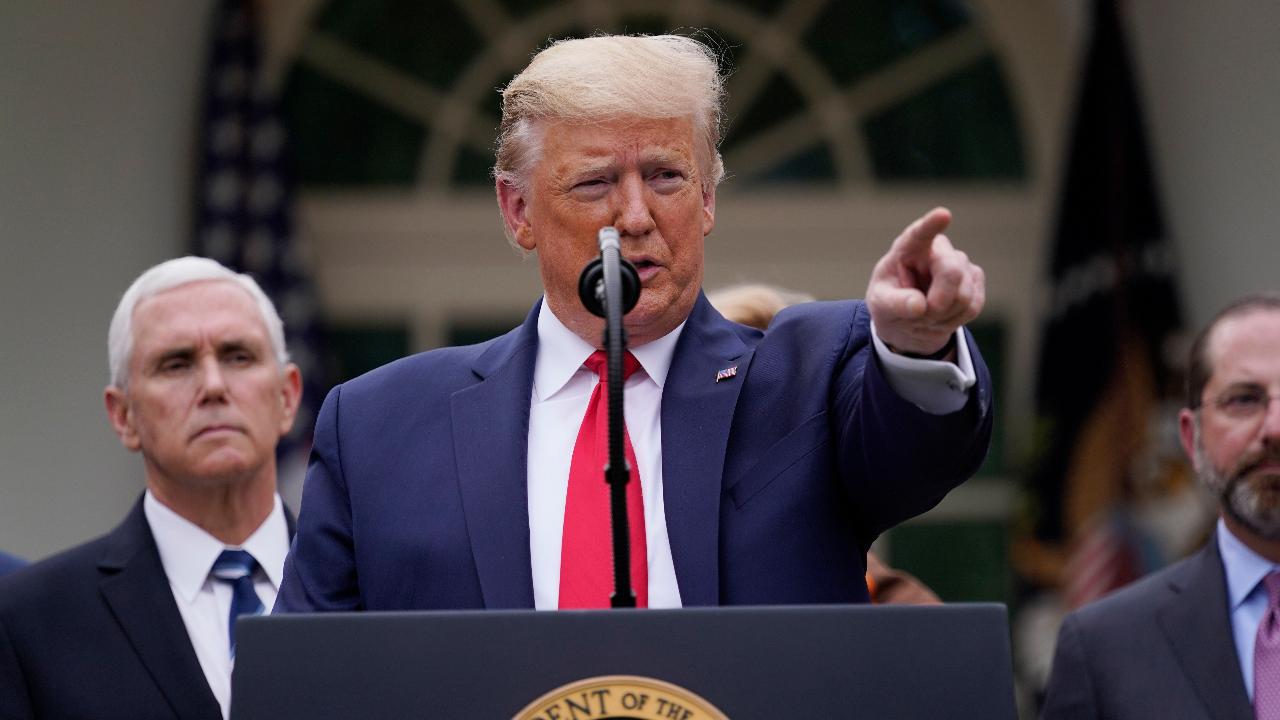Biden blue wave could crush these parts of the stock market
Defense, health care, energy, tech and banks could all come under pressure
A Democratic sweep in the 2020 election would threaten the stock market's record-setting growth under President Trump, analysts and investors say, potentially leaving industries from Wall Street to Silicon Valley in regulatory cross-hairs.
The S&P 500 gained 51 percent as of Monday since Trump’s victory against Democrat Hillary Clinton on Nov. 8, 2016, a period in which he loosened regulations he described as burdensome and worked with a GOP-led Congress to reduce corporate taxes.
The blue-chip Dow Jones Industrial Average, meanwhile, reached record high after record high, crossing the 20,000 benchmark in 2017 and hovering around 30,000 this year before the COVID-19 pandemic brought the economy to a standstill and resulted in a 34 percent plunge from the February peak.
The benchmark index has since battled back, closing Monday just 6.82 percent off its all-time high, but analysts and investors fear the progress may be lost if former Vice President Joe Biden wins the election and Democrats secure both chambers of Congress.

If the party walks away with the trifecta, “that's something the markets have to be concerned about,” Greg Valliere, chief U.S. policy strategist at Ontario, Canada-based AGF Investments, which has nearly $39.5 billion in assets, told FOX Business.
CORONAVIRUS VACCINE COULD TILT ELECTION TOWARD TRUMP BY ENERGIZING STOCK MARKET
Strategists up and down Wall Street have warned a so-called blue wave would almost surely mean at least a partial reversal of Trump’s corporate tax cuts and additional tax measures as well as the tightening of government regulations.
Trump and his allies in Congress cut the top corporate tax to 21 percent from 35 percent, among the highest in the world. Biden's plan calls for the corporate tax rate to be raised to 28 percent.
The S&P 500 could fall 10.5 percent or more from its July 7 levels when taking into account Democratic tax hikes and current price-to-earnings ratios, said David Rosenberg, chief economist at Toronto-based Rosenberg Research.
Goldman Sachs U.S. Equity Strategist David Kostin agreed, noting that tax hikes would be an unwelcome event for the market and represent a "larger risk to earnings and consequently to equity prices” than COVID-19.
Tax hikes aside, Biden’s proposed policies, coupled with a Democratic Congress, would take aim at a number of sectors that have blossomed under Trump.
“You'd have to get a little more cautious about defense stocks, health stocks, fossil fuel stocks, tech stocks, financial-services stocks, all of which would be vulnerable if Biden wins and takes the House and Senate with him,” Valliere said.

Defense and aerospace stocks have gained 47 percent since Election Day, as Trump fought to boost the military budget. He requested $705.4 billion for 2021, while the Democratically-led House proposed $694.6 billion, up 19 percent from former President Obama’s 2017 budget of $582.7 billion.
Trump also organized the first new branch of the military, the Space Force, in *73 years.
Stocks In This Article:
While Biden has supported increased military spending, most analysts agree that Trump would allocate more money to the armed forces.
The S&P 500 Health Care index has rallied 51 percent since election night, despite efforts from President Trump to lower the cost of pharmaceuticals.
Biden, like Trump, has stressed the need to reduce drug costs and while he has not run on Medicare-for-all, he could be pressured to approve such a platform if Democrats controlled both houses of Congress.
While the S&P 500 Energy Index has tumbled during the Trump era, largely due to a sharp drop in demand caused by stay-at-home orders aimed at slowing the spread of COVID-19, America has flourished into the world’s largest oil producer under the president’s deregulation.
Stocks In This Article:
The increased production helped keep a lid on oil prices, which have topped out near $77 a barrel during Trump's presidency. Oil prices reached more than $100 per barrel several times during the Obama years, when Biden was vice president, with a ceiling above $140.
Any progress might be undone by a blue wave, as Democrats have expressed interest in ending the granting of new oil and gas leases on federal land and offshore drilling.
Biden, who has named Green New Deal proponent Rep. Alexandria Ocasio-Cortez, D-N.Y., to head his climate task force, announced a $2 trillion climate plan on Tuesday.
The proposal, which has many components of the Green New Deal widely panned by conservatives, calls for a pollution-free power sector by 2035 and net-zero carbon emissions by 2050.
Republicans have criticized the Green New Deal as a jobs killer and said it would devastate America's energy industry.
CLICK HERE TO READ MORE ON FOX BUSINESS
Technology stocks have been the standout following Trump’s election victory -- despite the president's sometimes antagonistic stance toward social media firms as well as Amazon and Google -- with the Nasdaq Composite soaring 107 percent while booking 168 record-high closes, according to Dow Jones Market Data.
Under a Biden administration, Big Tech would likely face further pressure: Sen. Elizabeth Warren, D-Mass, who is reportedly among the contenders to be Biden's vice president or Treasury Secretary, has been a proponent of breaking up big tech firms including Amazon and Facebook.
"Biden's spending proposals, and there are more to come, are close to double his tax hikes."
She has also called for stricter regulation of America's banks, including tighter capital and liquidity requirements and the creation of a 21st-century Glass-Stegall Act that separates investment and consumer banks. S&P 500 financial stocks have gained 18 percent since Election Day.
Biden's overall economic plan, dubbed "Build Back Better," which calls for reviving American manufacturing and buying U.S.-produced goods, public health, clean energy and addressing racial inequities, relies on the additional revenue from his tax plan.
The proposal calls for more than $9 trillion of spending while generating $4 trillion of revenue, according to analysts at the Washington D.C.-based research firm Cornerstone Macro.
"Biden's spending proposals, and there are more to come, are close to double his tax hikes, so it's getting less likely he can or will moderate his proposed tax increases," Cornerstone analysts Andy Laperriere, Melissa Turner and Don Schneider wrote before the $2 trillion climate package was announced. "In fact, he is more likely to propose additional tax hikes, perhaps to address climate change.
* This article was corrected to reflect the last branch of the military was created 73 years ago, not the 230 that was originally stated.




















